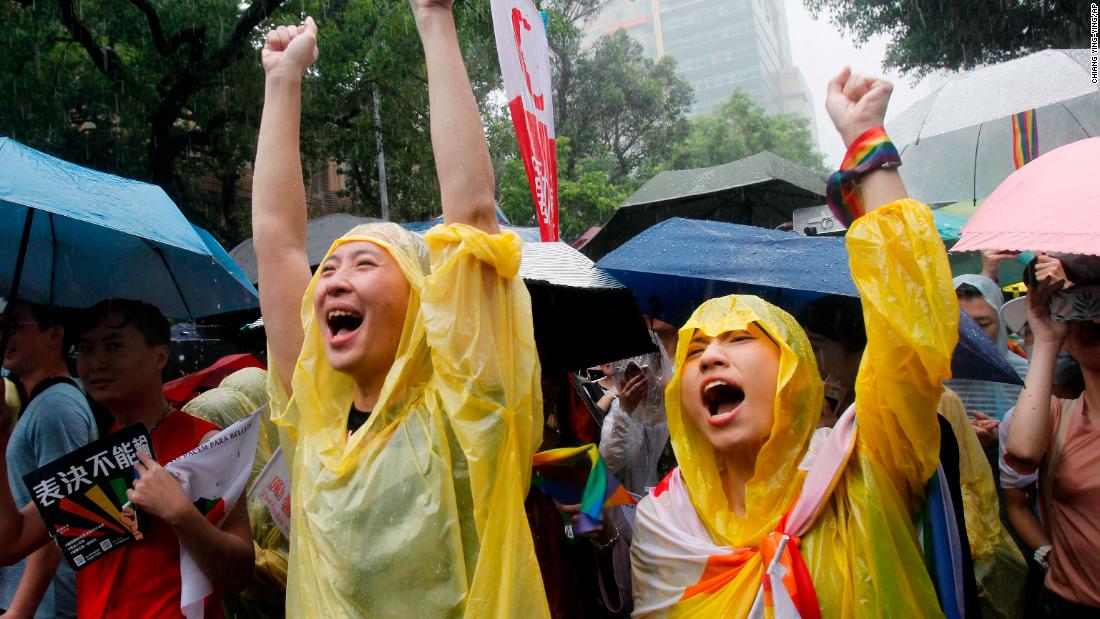TAIPEI, Taiwan — Thousands of marriage-equality advocates celebrated Friday in the pouring rain outside Taiwan’s legislature as it voted to become the first in Asia to fully legalize same-sex unions.
The law — which allows for same-sex couples to apply for “marriage registration” as part of “exclusive permanent unions” — came a week before Taiwan’s codes barring same-sex marriage would have been automatically dropped by court order.
Lawmakers had face pressure from both LGBT groups demanding sweeping reforms and religious groups and others opposing the changes. Friday’s 66-27 vote recognizes same-sex marriages and gives couples many of the tax, insurance and child custody benefits available to male-female married couples.
Taiwan’s high court ruled on May 24, 2017, that barring same-sex couples from marrying violates the Taiwanese constitution and gave the legislature two years to pass a corresponding law or see same-sex marriage become legalized automatically.
The process frequently stalled amid conservative opposition. But in November 2018, Taiwan voted in a public referendum to deny same-sex couples full marriage rights.
Taiwan’s ruling Democratic Progressive Party (DPP) responded by submitting legislation designed to comply with both the court ruling and the referendum result. Two competing bills that would be less favorable to the gay community were submitted, but they failed to gain traction.
The law could give the DPP and President Tsai Ing-wen a boost ahead of a presidential election in January. Gay rights advocates have long criticized the ruling party for failing to pass legislation sooner, but these concerns were largely absent amid the mood of optimism at Friday’s rally.
Chi Chia-wei, a gay rights activist for more than 30 years, said he was “very, very happy” to see Taiwan legalize same-sex marriage, calling the process “a strong demonstration of our democratic spirit.”
Friday’s legislation brought a wave of euphoria over a large crowd outside Taiwan’s legislature. Many attendees arrived in buses from outlying cities and stood under umbrellas in a torrential downpour as legislators voted on the articles that would make up Asia’s first same-sex marriage legislation.
The law ensures that Taiwan would stand as an example for Asia’s LGBT community. Thailand has proposed a law to recognize civil partnerships, but same-sex unions remain illegal elsewhere in Asia.
Jay Lin, chief executive of Portico Media and a gay father of two children, called the law a “beacon of hope” for Asia’s gay community. “I’m very glad that I’m living in Taiwan and I’m a beneficiary of these new laws,” he said.
[In historic decision, Taiwanese court rules in favor of same-sex marriage]
In neighboring China — which asserts sovereignty over Taiwan — popular LGBTQ microblogs were censored online in the wake of Taiwan’s 2017 high court ruling. The social media platform Weibo was criticized last month for restricting LGBTQ hashtags.
Taiwan has shown that “traditional culture is not against LGBT culture,” said Jennifer Lu, coordinator of the rights group Marriage Equality Coalition Taiwan. “That’s the message we want to send to the world.”
Before Friday’s vote, legislators in Taiwan’s opposition Kuomintang (KMT) party had rallied to promote a bill that would not define same-sex unions as “marriages.” On Thursday evening, the DPP amended its draft legislation to remove references to “same-sex marriages” while ensuring that same-sex couples would nonetheless be allowed to register marriages.
Tsai, the president, voiced her support of the legislation in a Twitter post, saying that Friday marked “a chance to make history and show the world that progressive values can take root in an Asian society.”
The ruling DPP holds 68 of the 113 seats in Taiwan’s legislature. Tsai’s premier and the party’s caucus whip had worked relentlessly over the past week to secure enough support for the legislation to pass.
Hundreds of couples have already registered to marry on May 24, the deadline set by the high court, but they have not known exactly what rights they would be afforded as newly married couples.
Taiwan’s new law grants same-sex couples the right to marry outside its civil code, which governs marriage rights for heterosexual couples. This was done to comply with the 2017 court ruling as well as the November 2018 referendum, in which voters decided that the civil code should restrict marriage to being between a man and a woman.
KMT legislators had called for Taiwan to respect the referendum results by voting in favor of an alternative bill that would limit same-sex unions to “familiar relationships” and would not consider same-sex partners to be spouses.
A third bill, proposed by DPP legislator Lin Tai-hua, contained a controversial clause that would allow family members to request that a same-sex union be annulled.
Gay rights advocates have called for full adoption rights for same-sex couples, who are barred from adopting non-blood relatives under the new law.
An amendment proposed by the New Power Party (NPP), a minor political party aligned most closely with the DPP, would have allowed Taiwanese nationals to enter same-sex unions with partners from countries that do not recognize same-sex marriage. It was rejected by DPP legislators.
Lu said the law represents a major step forward for Taiwan’s gay community, especially considering the strong conservative backlash to the 2017 high court decision. “I think the result is an accomplishment at this stage,” she said. “But we will keep on fighting for full marriage rights.”
Read more:
Taiwan’s 2020 election campaign is already kicking off. It’s all about the U.S. and China.
China is pushing back against Taiwan for these three reasons
Today’s coverage from Post correspondents around the world
Like Washington Post World on Facebook and stay updated on foreign news
https://www.washingtonpost.com/world/asia_pacific/taiwan-becomes-first-country-in-asia-to-legalize-same-sex-marriage/2019/05/17/d60e511e-7893-11e9-bd25-c989555e7766_story.html
2019-05-17 12:33:45Z
52780298339081


